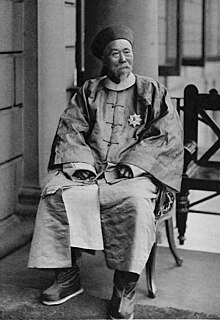Li Hongzhang
|
Li Hongzhang First Class Marquis Suyi, GCVO |
|
|---|---|

Li Hongzhang in 1896
|
|
| Viceroy of Zhili and Beiyang Trade Minister | |
|
In office 1871–1895 |
|
| Monarch |
Tongzhi Emperor Guangxu Emperor |
| Preceded by | Zeng Guofan |
| Succeeded by | Wang Wenshao |
|
In office 1900–1901 |
|
| Preceded by | Yu Lu |
| Succeeded by | Yuan Shikai |
| Viceroy of Huguang | |
|
In office 1867–1870 |
|
| Preceded by | Guanwen |
| Succeeded by | Li Hanzhang |
| Viceroy of Liangguang | |
|
In office 1899–1900 |
|
| Preceded by | Tan Zhonglin |
| Succeeded by | Tao Mo |
| Personal details | |
| Born |
15 February 1823 Hefei, Anhui, Qing Empire |
| Died | 7 November 1901 (aged 78) Beijing, Qing Empire |
| Spouse(s) | Lady Zhou Zhao Xiaolian Lady Mo |
| Relations | (father) (brother) |
| Occupation | Official, general, diplomat |
| Signature | |
| Military service | |
| Allegiance |
|
| Service/branch |
Beiyang Fleet Huai Army |
| Battles/wars |
Taiping Rebellion First Sino-Japanese War |
| Li Hongzhang | |||||||||||
| Traditional Chinese | |||||||||||
|---|---|---|---|---|---|---|---|---|---|---|---|
| Simplified Chinese | |||||||||||
|
|||||||||||
| Transcriptions | |
|---|---|
| Standard Mandarin | |
| Hanyu Pinyin | Lǐ Hóngzhāng |
| Wade–Giles | Li3 Hung2-chang1 |
| IPA | [lì xʊ̌ŋ.ʈʂáŋ] |
Li Hongzhang (also romanised as Li Hung-chang) (15 February 1823 – 7 November 1901), GCVO, was a Chinese politician, general and diplomat of the late Qing dynasty. He quelled several major rebellions and served in important positions in the Qing imperial court, including the Viceroy of Zhili, Huguang and Liangguang.
Although he was best known in the West for his generally pro-modern stance and importance as a negotiator, Li antagonised the British with his support of Russia as a foil against Japanese expansionism in Manchuria and fell from favour with the Chinese after their defeat in the First Sino-Japanese War. His image in China remains controversial, with criticism on one hand for political and military mistakes and praise on the other for his success against the Taiping Rebellion, his diplomatic skills defending Chinese interests in the era of unequal treaties, and his role pioneering China's industrial and military modernisation. He was presented the Royal Victorian Order by Queen Victoria.
Li Hongzhang was also known by other names. His courtesy names were Zifu (子黻; Zǐfú; Tzu-fu) and Jianfu (漸甫; 渐甫; Jiànfǔ; Chien-fu). His pseudonyms were Shaoquan (少荃; Shàoquán; Shao-chüan), Yisou (儀叟; 仪叟; Yísoǔ; I-sou) and Shengxin (省心; Shěngxīn; Sheng-hsin). The posthumous name awarded to him by the Qing government was Wenzhong (文忠; Wénzhōng; Wen-chung). He was also referred to as Li Zhongtang (李中堂; Lǐ Zhōngtáng; Li Chung-tang) and Li Fuxiang (李傅相; Lǐ Fùxiàng; Li Fu-hsiang); "Zhongtang" and "Fuxiang" referred to his honorary appointments as Grand Secretary (大學士) and Crown Prince's Grand Tutor (太子太傅) respectively. He also held the noble peerage First Class Count Suyi (一等肅毅伯; 一等肃毅伯; Yīděng Sùyì Bó) and was posthumously honoured as First Class Marquis Suyi (一等肅毅侯; 一等肃毅侯; Yīděng Sùyì Hóu).
...
Wikipedia
